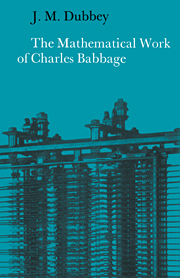Book contents
- Frontmatter
- Contents
- Preface
- 1 Introduction
- 2 British mathematics 1800–30
- 3 The Analytical Society
- 4 The calculus of functions
- 5 ‘The Philosophy of Analysis’
- 6 Miscellaneous papers in analysis, probability and geometry
- 7 Notation
- 8 Babbage and his computers
- 9 Conclusion
- Appendix: mathematical books and papers by Charles Babbage
- Index
2 - British mathematics 1800–30
Published online by Cambridge University Press: 22 December 2009
- Frontmatter
- Contents
- Preface
- 1 Introduction
- 2 British mathematics 1800–30
- 3 The Analytical Society
- 4 The calculus of functions
- 5 ‘The Philosophy of Analysis’
- 6 Miscellaneous papers in analysis, probability and geometry
- 7 Notation
- 8 Babbage and his computers
- 9 Conclusion
- Appendix: mathematical books and papers by Charles Babbage
- Index
Summary
The period between 1800 and 1830 was not a brilliant one for British mathematics by any standards. The decline which had begun early in the eighteenth century was continued. Very little original work of any great merit was accomplished and it is difficult to name a single British mathematician of this time whose work is still remembered. By contrast, these were years of great advance on the Continent. Gauss was producing his best work, while in France, Lagrange, Laplace, Legendre, Cauchy, Fourier, Poisson, Monge and Poncelet, to mention a few prominent names, were all active. Who were the contemporary British mathematicians who compared with these? The same question was asked in 1830 by A. B. Granville, but he had a ready answer: ‘Ivory, Woodhouse, Morgan, Herschel, Babbage, Kater, Christie, Barlow, Baily, Gompertz, Whewell, Allman, Peacock, Lubbock, Bromhead and Groombridge.’ This was a list which evidently satisfied its compiler, but bears no comparison with the Continental mathematicians.
However, the period is interesting as a time of constructive introspection, when mathematical reformers looked for the causes of the sickness and tried to cure them, a necessary preliminary to the great advances made in mid-century by such mathematicians as Cayley, Sylvester, Maxwell, Hamilton and Boole.
There are several reasons for the British decline, and most of these relate to the giant figure of British mathematics, Sir Isaac Newton. His retirement from active research at the beginning of the eighteenth century created a vacuum which mathematicians of the calibre of Cotes, De Moivre, Taylor and Maclaurin could only partially fill.
- Type
- Chapter
- Information
- The Mathematical Work of Charles Babbage , pp. 10 - 30Publisher: Cambridge University PressPrint publication year: 1978
- 3
- Cited by



